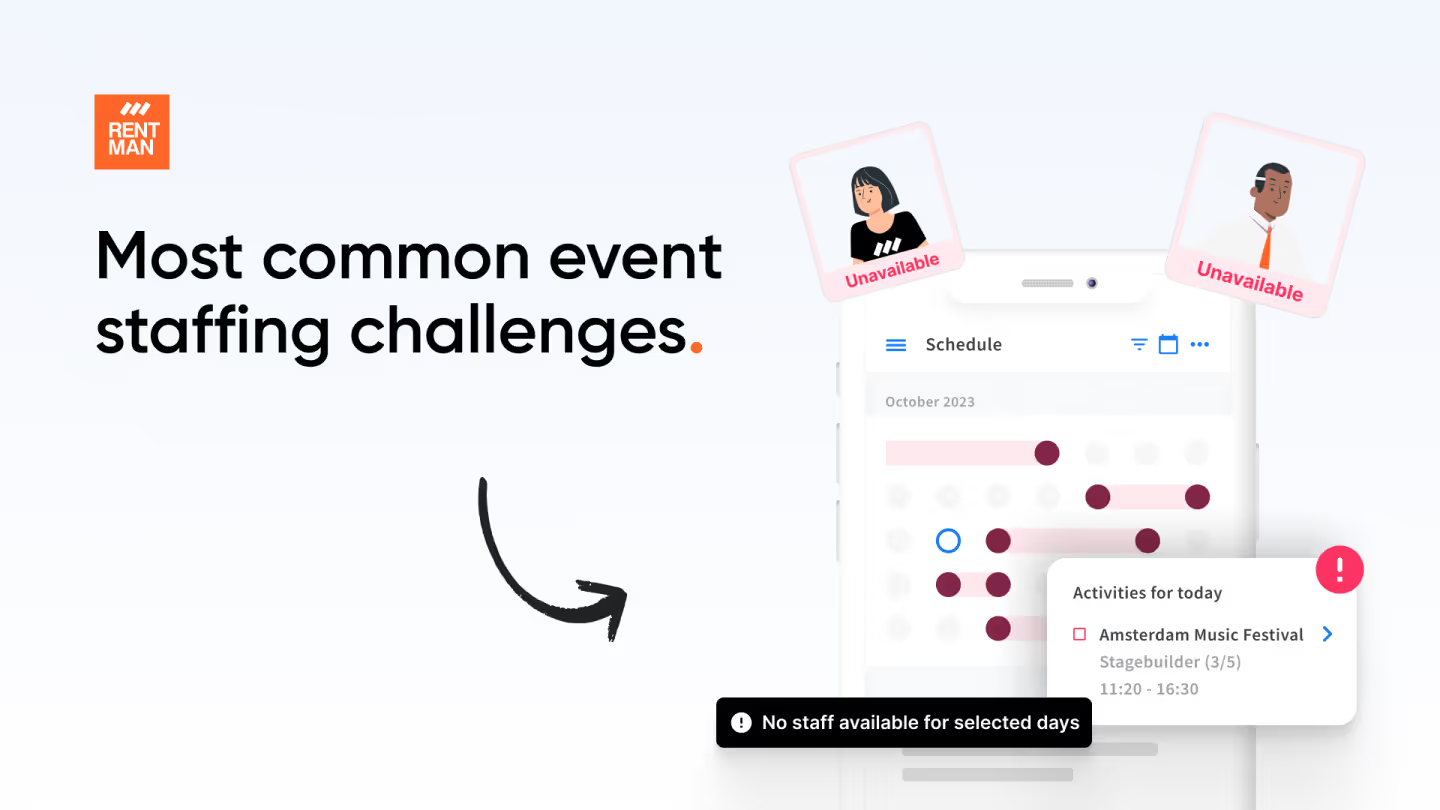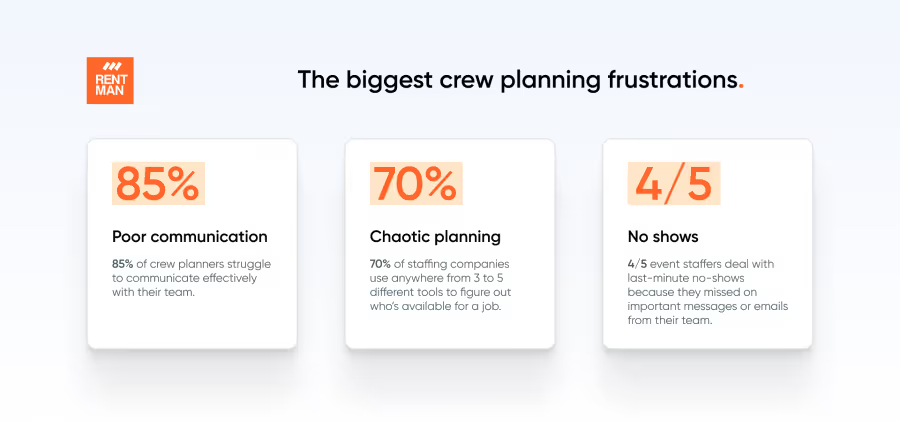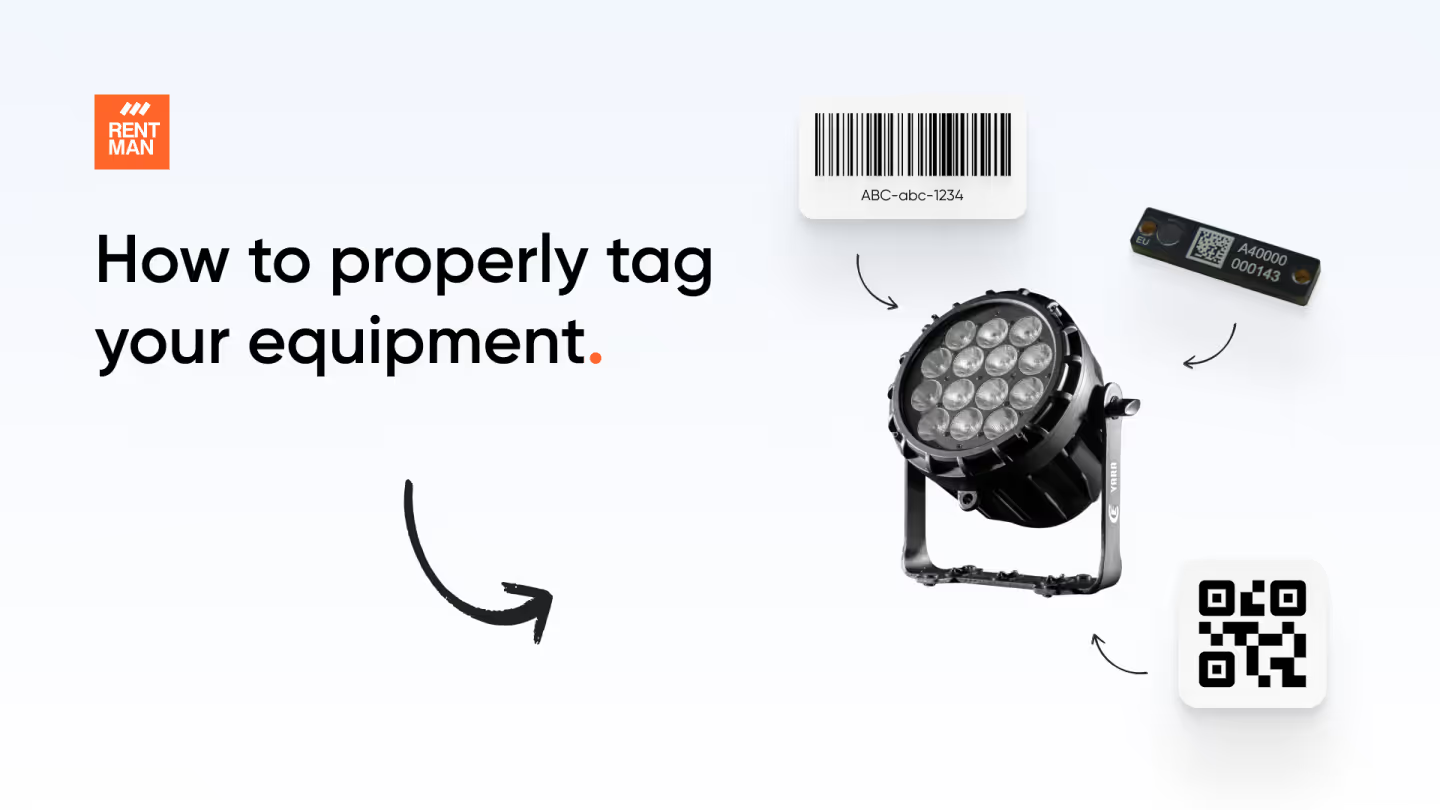The 5 most common event staffing challenges & how to overcome them

Ever since COVID-19, the event industry has been facing a staffing shortage. From a manpower shortage to the wrong crew members being scheduled for an event, these are just some of the challenges event planners face.
So in this blog, we’ll go over the four most common event staffing problems in addition to practical and effective solutions to overcome them. Here’s what we’ll cover:
1. Why is there a staffing shortage?
2. Challenge 1: Not enough skilled labor on hand
3. Challenge 2: Your planned crew isn't showing up
4. Challenge 3: You don’t know who's the right person for the job
5. Challenge 4: Crew members with the wrong skills are being planned for events
6. Challenge 5: Managing Last-Minute Schedule Changes
Why is there a staffing shortage?
The event industry is back in business and recovering since COVID-19, but it’s also grappling with crew scarcity and a lack of skilled labor. In the US, the leisure and hospitality industry is struggling to fill 1.6 million open job positions.
Why is there such a staff shortage? Because the industry traditionally offers lower wages, unstable hours, and mandatory in-person attendance. Making many positions unappealing for those seeking a steady lifestyle.
However, that doesn’t mean it’s hopeless for your event company. Depending on your problem, you can implement practical solutions to ease your event staffing challenges.
Challenge 1: Not enough skilled labor on hand
Many event management companies are experiencing a shortage of staff, especially skilled labor. And this manpower shortage not only affects the quality of your events but can also tarnish your company’s image in the eyes of clients.
To remedy this, invest in upskilling your event professionals by offering training and development opportunities to your in-house employees. From a yearly education stipend to offering monthly trainings, doing so ensures your team remains up-to-date on current tech and strategies.
Additionally, build your network of freelancers by asking your current team for referrals. Word of mouth is golden in the event industry and your network can be your best recruitment source. So tap into your network for recommendations and specialized talent to build your pool of skilled labor.
Lastly, when creating vacancies, don’t simply advertise responsibilities. Highlight the fun and excitement to be had. Show people the thrilling opportunities your event company offers. This inspires individuals to be part of something exceptional, not just fill a role.

Challenge 2: Your planned crew isn't showing up
You meticulously plan an event, only to have a significant portion of your crew not show up due to event labor issues.
Whether some team members were simply disorganized or they weren’t informed, when this happens, it’s not only frustrating, but it also looks unprofessional for your company. New clients won’t become repeat customers and, based on their experience, they won’t recommend you to their colleagues if this keeps happening.
This scenario is a frequent challenge in the events industry. Why? Because you have no central way of communicating with your team.
It’s common to use email, WhatsApp, calling, and texting to communicate with different team members. However, if there’s a last-minute change, you have to remember each team member’s preferred communication method. This can quickly get chaotic and messy as you try to reach multiple people across different platforms.
Last-minute staff shortages happen, but it shouldn’t be the norm. To avoid such scenarios, communicate any new events and upcoming schedules to all of your team members. Use automated staff scheduling tools, like Rentman, to manage communication channels when working with freelancers and remote crew.
Share instructions, updated schedules, and call sheets with your team in seconds and spend 70% less time on communication. Instead, automate communication and ensure everyone is up-to-date about their work schedule and project updates.

Challenge 3: You don’t know who's the right person for the job
Some events require people with a specialized skill set. However, if this is a niche skill, how do you know which crew member or freelancer possesses it?
When you need to remember who has a specific skill set while also managing communication across different platforms, and manually updating an Excel spreadsheet, it can be difficult to figure out who to best schedule for a job.
Identifying the right person for the job shouldn’t be a difficult task that hinders your day. But it does take some upfront preparation.
Whenever you onboard new team members or freelancers, have them fill in a questionnaire that highlights their skills and experience. Then organize this information into accessible folders so that anyone who needs to create a plan can have easy access to it. And quickly identify the perfect fit for each role.
Doing so leads to efficient crew allocation while streamlining event planning, allowing Crew Planners or Project Managers to focus on other essential aspects of event management.
And, if you’re basing more of your assignments on someone’s skill set rather than seniority, newer crew members can be given tasks that match their skills. Doing this optimizes your workforce and reduces the need for lengthy training sessions. Thus saving you valuable time and company resources.
Challenge 4: Crew members with the wrong skills are being planned for events
If a crew member with a mismatched skill set is assigned a task beyond their capabilities, chaos follows. Such a mistake leads to errors during an event, panic, delays, and unhappy clients.
But such an event staffing mistake can easily be avoided. How? By, again, discovering the skills and experience of your staff and organizing that information and making it easily accessible.
Armed with accurate and up-to-date information about each crew member’s skills, event managers and Crew Planners will make fewer mistakes when selecting the crew for an event.
Ensuring no last-minute panic, minimal staff shortage, and happy clients.
Challenge 5: Managing Last-Minute Schedule Changes
One of the most unpredictable challenges in event staffing is dealing with last-minute schedule changes caused by crew cancellations, weather disruptions, or event venues needing adjustments. These sudden shifts can throw off carefully laid plans, leaving event planners scrambling to fill critical roles or rearrange logistics. Managing these disruptions efficiently is key to maintaining professionalism and meeting client expectations.
To overcome this challenge, create a contingency plan that includes a list of on-call staff or backup freelancers who can step in when needed. Using a crew planning platform like Rentman also helps streamline these adjustments by enabling real-time schedule updates and notifications to crew members.
This way, any last-minute changes are communicated instantly, ensuring a smooth, professional operation even when plans change at the last moment.
Proactively overcome staff shortages
Solving the event staff shortage will take time, but event companies can take proactive steps to address this issue effectively. But practical solutions such as a large network of freelancers, a clear system to highlight everyone’s skills, and a communication plan ensure you can minimize disruptions and always have the people you need and can trust to help at events.
If you want to take your efforts to the next level, consider implementing an event staffing solution. Rentman can help you manage everyone’s availability via one easy calendar, stay on top of last-minute changes, and communicate schedules in just a few clicks.
Conclusion
In conclusion, while staffing shortages and crew management issues have become prevalent in the event industry, these challenges can be effectively addressed with the right strategies and tools. The journey to overcoming these obstacles starts with building a reliable pool of skilled freelancers and tapping into your network for trusted recommendations. Investing in crew development through ongoing training also ensures that your team is skilled, adaptable, and well-prepared for the demands of each event.
Additionally, a clear and organized system for tracking each crew member’s skills and availability enables you to assign the right people to the right tasks, ultimately reducing the risk of mismatched skill sets and ensuring seamless execution. With a streamlined approach to communication—one that moves away from scattered messages across various platforms and consolidates all event details in one place—you can drastically reduce the chance of miscommunication and improve reliability within your team.
Last-minute schedule changes are inevitable in the dynamic world of event planning. However, by implementing a contingency plan and maintaining an up-to-date database of on-call staff or backup freelancers, you can ensure minimal disruption even when unforeseen circumstances arise.
Using an event staffing platform can further enhance your adaptability, allowing for real-time schedule updates, centralized information access, and easy communication with your crew in just a few clicks, allowing you to focus on delivering high-quality events.
While addressing staffing shortages in the event industry may take time, these proactive measures help you navigate challenges more smoothly. With a robust staffing strategy and supportive tools, you can build a resilient team, reduce staffing-related risks, and continue delivering exceptional experiences for your clients.
Adopting solutions that prioritize skill matching, seamless communication, and flexible scheduling will keep your operations on track, even in the face of staffing constraints.
By taking these steps, you can transform staffing challenges into manageable elements of a successful, professional event operation.
Frequently asked questions
Previous blog posts

How a serial number works and why you should use it
How a serial number works and why you should use it

How to set Asset Tags for your Equipment: A Comprehensive Guide for Rental Businesses
How to set Asset Tags for your Equipment: A Comprehensive Guide for Rental Businesses

